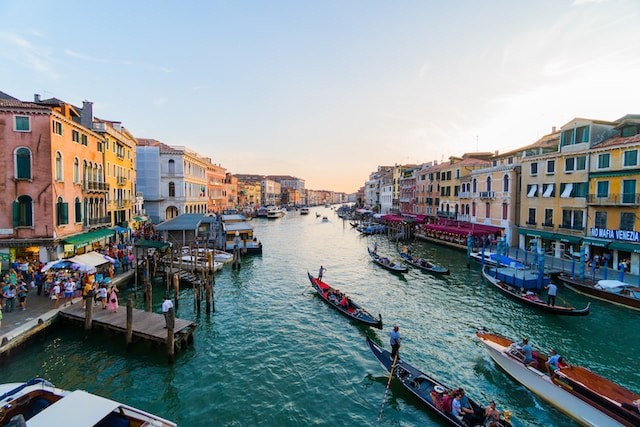In Venice, a famous Italian city, new rules will start in June to manage the large number of tourists. Groups larger than 25 people and the use of loudspeakers are banned. This is part of efforts to reduce problems caused by too many visitors.

Venice Imposes New Tourist Rules
Venice, known for its beautiful canals and historic architecture, is taking action against the challenges of mass tourism. Starting June, the city will enforce new regulations to control the impact of the vast numbers of tourists visiting each year.
The city announced that groups of tourists cannot be larger than 25 people. Also, using loudspeakers is not allowed anymore because they cause confusion and disturb people, as BBC reported. These steps aim to make the city more manageable and pleasant for tourists and residents.
In 2019, Venice was visited by nearly 13 million people. The city, which is only 7.6 square kilometers in size, has been struggling with the effects of over-tourism. This includes overcrowding and damage to its delicate infrastructure. The situation is so serious that more local people are leaving the city, worried about the increasing number of visitors.
Read Also : The Best Places To Eat In Venice, Italy
Venice also plans to charge a €5 fee for day-trippers starting in September to tackle this issue. This move follows the banning large cruise ships from the city's historic center in 2021. These ships were causing pollution and harming the city's foundations.
Venice is not alone in facing these problems. Other popular destinations in Italy and Europe are also taking measures. For example, Florence has stopped new short-term holiday rentals in its center. Rome has introduced fines for behaviors that affect its public spaces. Outside Italy, places like Athens and Hallstatt in Austria have set limits on the number of visitors to protect their historic sites.
These efforts show a growing trend among tourist hotspots to balance welcoming visitors and preserving their unique heritage and environment.
Venice to Charge €5 for Day Visitors Starting Spring 2024
Starting in spring 2024, tourists visiting Venice for the day will have to pay a €5 entrance fee. This new rule is causing a lot of discussions. The Art Newspaper mentioned that many people think the fee will not help control the number of visitors. They are worried about long lines at the city's entry points. Officials say they can tell who's a tourist and who's not, but some are doubtful.
The idea is to manage the number of people visiting famous places. Like Venice, other places around the world are doing similar things. French Polynesia is setting a visitor limit, the Acropolis in Greece only allows a certain number of people per day, and the Galapagos Islands have an entry fee. Cities like Amsterdam and Trentino-Alto Adige in Italy are also taking steps to control tourism.
Experts say tourism needs to be sustainable, like farming or mining. It means not visiting some places as often or planning trips more carefully. Venice's leaders try to avoid upsetting certain groups, like airport workers and small businesses, by setting a low fee. However, experts suggest limiting the number of people in the city each day and charging more for entry.
If Venice charged €25, like the Uffizi Gallery, it could make a lot of money for city projects. This includes important works to protect the city from rising water levels.
Lindblad Expeditions, a tour company, shows that tourists can become supporters of the places they visit. In Venice, visitors could be educated about the city's beauty and challenges. This could turn them into supporters, helping to fund the city's conservation. But for this to happen, Venice's leaders need to change their approach and think about the city's long-term future.
Related Article: Venice Suffers Worst Flooding in 50 Years
This article is copyrighted by Travelers Today, the travel news leader




